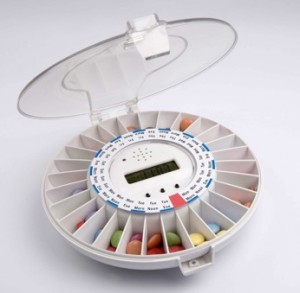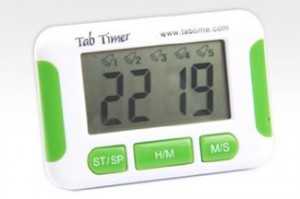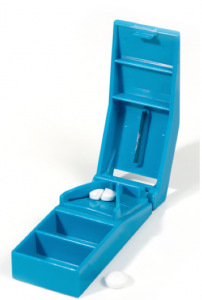Managing Your Medication
Managing Medication
Despite over a century of study and research, schizophrenia is an illness which is still not completely understood. And because we do not understand it completely, it tends to attract more than its fair share of myths. One of the most enduring myths that has grown up since the old asylums were closed and the policy of care in the community was introduced is that people with schizophrenia cannot be trusted to organise taking their medication.
It is simply not true that people with mental health conditions are not very good at taking their medication. Studies have shown that compliance with medication is no worse in mental health conditions like schizophrenia than it is in long term physical ailments such as asthma or high blood pressure. In fact demographic factors such as whether you are single or in a relationship are more likely to play a role in your compliance.1
Remembering to take antipsychotic medication is a vital part of staying well and of a successful recovery strategy. However organizing medication does not come naturally to many people and is another one of those skills that people living with schizophrenia need to learn as part of a successful recovery.
Does antipsychotic medication really work?
About 70-80% of people with schizophrenia who take antipsychotic medication will experience an improvement in their positive symptoms; the delusions and hallucinations.6 This is about the same degree of effectiveness that antibiotics like penicillin have in treating infections such as pneumonia. However there is a range of antipsychotic drugs available to the psychiatrist and some will work better for some people than for others. In some cases antipsychotic medication can result in hallucinations and delusions disappearing altogether.2,4
Furthermore the beneficial humanitarian effect of the antipsychotic drugs should not be underestimated. Before the introduction of these drugs in the UK about 70% of people with a diagnosis of schizophrenia were continuously confined in mental hospitals often for years at a time: today it is only about 5% and the average length of stay in hospital is measured in months.3
Taking Tablets
Side Effects
If you are taking a new medication you may experience unfamiliar side effects. Our information sheet on coping with Side Effects of Medication will give you some guidance on dealing with this. However if you experience the symptoms of an allergic reaction such as difficulty breathing, difficulty swallowing or if you come out in a rash you should seek emergency medical help immediately by going to your local Accident and Emergency Department or dialing 999 for an ambulance.

Most of the large chemists chains have repeat prescription services that save you having to remember when your meds are due. (Image: Minerva Studio/Shutterstock)
Collecting prescriptions
For most people taking antipsychotic drugs, they will be given in tablet form which will be collected from the chemist using a prescription provided by your doctor, usually nowadays your GP. First of all it is important to arrange to collect your prescription on time. Rather than having to remember to do this yourself it is better if you can use the chemist’s repeat prescription service. Under this type of scheme the repeat prescription will be collected from the doctor by the chemist’s staff when it is due (usually monthly) and made up by the chemist waiting for you to collect it.
Some chemists even have a delivery service which will deliver it to your home and some have text alert systems to remind you when it is ready. This is by far a better system than having to rely on your own memory and also saves you having to queue up at the doctors every month to get a repeat prescription so if you haven’t already done so contact your chemist to find out if they provide this service and if they don’t then consider changing to a chemist that does.
If these repeat prescription services are not available in your area then you will have to rely on your own memory. Don’t wait until you have run out of your meds: use a diary or wall calendar and put a note in it about a week before your prescription is due to remind you to arrange for a repeat prescription.4
Emergency medication reserve
However there will always be occasions when things go wrong and we run out of our meds: perhaps we haven’t got our repeat prescription in on time, bad weather prevents us from getting out or the chemist’s computer system has gone down. For this reason it is a good idea to keep an emergency supply of medication in reserve at home. Speak to your GP about this and ask them for an additional prescription to allow you to keep a small supply in reserve at home, about two weeks worth is about right. Don’t forget to keep an eye on the expiry dates though and use up the oldest first before starting on the new.4 Return any out of date medicines to your chemist: don’t put them down the toilet or in the bin.
Checking your medication
When you get your prescription home it is important to check that you have received the correct medications and to read the instructions on the label on the box. If you think that anything is wrong or if you think that the instructions for taking the pills are not as you were told by the doctor then call the chemist and ask them to check. Don’t be afraid of doing this. Chemists do take strict precautions against making mistakes but they are only human and errors do happen occasionally. If you are happy that the medication is correct follow the instructions on the label. If you haven’t taken this particular medication before then you should read the patient information sheet that is included in every box of pills.

Weekly pill organisers like this Medimemo are a great way of remembering to take your meds.
Remembering to take your medication
Having got your prescription you now need a method of reminding you to take your medication each day. Relying on memory alone may work for some people but most will benefit from using a pill organizer. In its simplest form this is a small box divided up into each day of the week and with sections for the time of day. This is filled up once a week with a week’s supply of medication and it allows the person with schizophrenia to tell at a glance when they need to take their tablets (or even if they have already taken them).
If you decide to use a pill organizer it is a good idea to allocate a short slot each week, say on a Sunday morning, to filling it up for the week ahead.4 You can set up an automated alarm on your computer or mobile to remind you to do this or put a note in a diary or calendar. There are also apps available for smartphones. Simple pill organizers are available from your chemist or on line from Boots or Amazon and cost only between £5 and £20.

The Medelert pill dispenser sounds an alarm when it is time to take your pill. (Image: Medelert)
More complex high tec pill organizers are available that use time switches and alarms to remind you to take your pills. Some have audible or even spoken alarms. They cost more but are undoubtedly very helpful and can contain up to a month’s supply so may only need to be filled up once a month. You can see a useful video of the Medelert pill organiser on Youtube.

Special electronic timers like this Tab Timer are available to help manage your medication. (Image: Tabtime.com)
There are also special alarm clocks available to help with remembering to take meds such as the Tab Timer which can be set for up to eight reminders each day.
If you are living with your family or with a partner and find that you are having difficulty organising taking your medication it may be a good idea to ask someone else to do it for you, however as your recovery progresses this is a basic skill that you will benefit from learning yourself.
If you are taking pills it is always a good idea to keep a copy of your prescription in your wallet or purse. If you are taken into hospital in an emergency then the hospital staff will need to know about any medications you are taking and by having a copy of your prescription with you you won’t have to rely on your memory alone. In addition some medications can alert drugs detector dogs used by the police for finding street drugs and having a copy of your prescription to hand may save you an unnecessary visit to the police station.

Pill cutters cost a few pounds and can be obtained at most chemists. (Image: Jo Ann Snover on Shutterstock)
Sometimes the doctor will prescribe half a pill rather than a full pill and in this case it is a good idea to invest in a simple pill cutter. Again these are inexpensive costing only a few pounds and are available from your chemist or online from Boots and Amazon.
Forgetting to take your medicine
What will happen if you forget to take your meds? Well most antipsychotic medication will stay in the body for at least a couple of days and forgetting to take your dose for a day will not cause an instant relapse. And after all we all forget now and again. However, if you find that you have a continuous problem of remembering to take your meds and you are missing multiple doses then you should speak to your doctor or community psychiatric nurse about ways to improve taking it or alternative methods of taking it.
Security
Keep your medication out of sight and if possible under lock and key. This is especially important if you have children around. Remember that some of the medications that are prescribed for schizophrenia such as Diazepam have value as street drugs and friends may be tempted if you leave yours lying around. In addition it is probably not a good idea to let your friends see that you are taking a lot of medication until your are ready to tell them about your schizophrenia.
Going Away
If you are going away on holiday at the time your prescription is due then contact your chemist early to arrange for a prescription to be issued before you leave. Remember to take a copy of your prescription with you if you are traveling abroad so that you can satisfy Customs that your medicines have been legally prescribed.
Injections
During the early stages of an episode of schizophrenia it may be that the person with schizophrenia themselves cannot be relied on to remember to take their medication regularly. This may be because they do not understand that they are suffering from a mental health condition or simply that their thoughts are so disorganized that they cannot remember to take tablets.
There are also people with schizophrenia who develop delusions around their medication and believe that the medicine that they are being given is really a poison. Similarly some people with schizophrenia may believe that the medication that they are taking is causing their symptoms.
When people are reluctant to take their medication for these reasons they may only pretend to take it sometimes by concealing the pill under their tongue and then spitting it out later or even in some cases making themselves vomit after taking the pills. Whilst this behaviour is extremely frustrating for carers and relatives, it is important that you do not blame the person with schizophrenia for it. Like all disturbed behaviour in schizophrenia it is not the fault of the person suffering from schizophrenia, it is simply another cruel feature of the illness. In many ways the greatest challenge for people caring for people with schizophrenia is to maintain sympathy for the person even when their behaviour is uncooperative.
In this case the doctor will often recommend taking the medication by something called a depot injection. This will involve your community psychiatric nurse visiting you at home every couple of weeks and giving you an injection of antipsychotic medicine rather than you taking tablets. The injection is usually given into the buttocks and can be a bit painful but it does ensure that you will get the full benefit of the medicine and reduce the risk of relapsing considerably.
Syrups and Dispersible Pills
An alternative to injections for people who need encouragement in taking their medicine is dispersible tablets and syrups. Dispersible tablets dissolve on the tongue and unlike ordinary pills cannot be hidden. Antipsychotic medication can also be given as a syrup.
Compliance Therapy
In some areas special therapy courses using a cognitive behavioural approach are available to help people who are not very good at taking their medication. These courses are designed to provide information and advice about the medication, explore areas of concern that the person with schizophrenia may have and encourage them to take responsibility for their recovery.5
Taking PRN Medications
Most medications are taken at regular intervals perhaps daily or at certain times of the day but sometimes the doctor may prescribe medication as PRN. PRN (from the latin term: pro re nata) means that the medication is taken when necessary rather than at regular intervals. It is not uncommon for doctors to prescribe medicines like anti-anxiety drugs such as diazepam (Vallium) on this basis.
Similarly you may have an agreement with your doctor to increase your dose of antipsychotic voluntarily if you find that your positive symptoms like voices are getting worse. It is a good idea to keep a diary of how often you take your PRN medication and to make sure that you discuss it with your doctor or CPN.
Paying for Prescriptions
In the UK, for people receiving certain state benefits, prescriptions are free of charge. If you are working then you may have to pay for your prescription although this may not apply if you are receiving Working Tax Credit. The current cost of a prescription (June 2014) is £8.05. However you can buy a prescription pre-payment certificate for three or twelve months that may save you money. The 12 month certificate costs only £104 and so saves you money if you need 13 or more items during the year. The certificate can be paid for in monthly instalments by direct debit. See the NHS Choices website for more details or ask at your chemist.
If you are working but on a low income you may also be entitled to help under the NHS Low Income scheme.
References
1. Tacchi, M and Scott J, 2005, Improving Adherence in Schizophrenia and Bi Polar Disorders, Wiley, P23.
2. Steele K, and Berman C, 2001, The Day the Voices Stopped, Basic Books, P199.
3. Cutting J and Charlish A, 1995, Schizophrenia, Thorsons, p124.
4. Author’s personal experiences.
5. Reveley A, 2006, Your Guide to Schizophrenia, Hodder Arnold, P94.
6. Burton N, 2012, Living with Schizophrenia, Acheron Press, P59.







